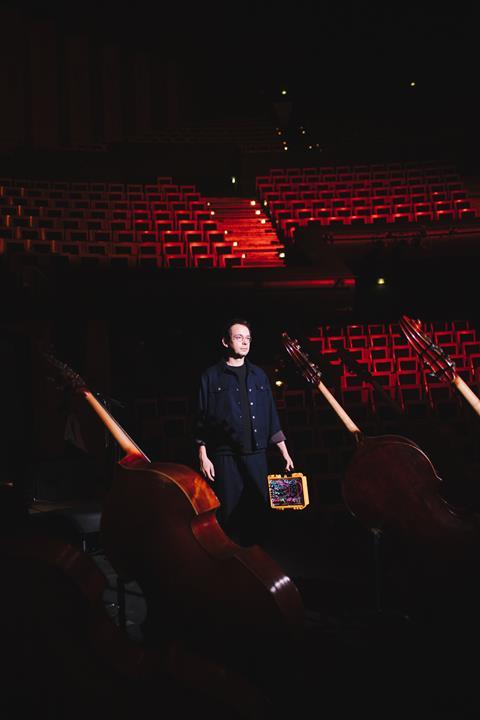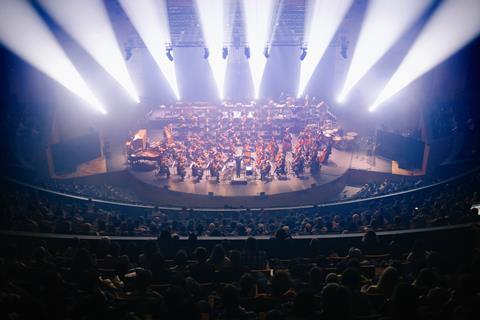Erwan Castex, a.k.a French electronic music virtuoso Rone, speaks about fusing stringed instruments with music production, as he joins the forces with London Contemporary Orchestra in an expansive new collaboration

Discover more Featured Stories like this in The Strad Playing Hub
The story of L(oo)ping, like that of any great leap, began with trepidation. For someone like me, who’s self-taught, I felt an inferiority complex about scholarly music. Luckily, the composer and arranger, Romain Allender was there to break the ice. Romain, who has for many years worked beside Alexandre Desplat on several renowned scores (The Grand Budapest Hotel by Wes Anderson and The Shape of Water by Guillermo del Toro among others) has become my musical partner on the 2017 piece, Motion alongside Les Siècles, a collaboration that not only sealed our friendship but also opened a new world for me, one in which orchestra and electronics conversed with a playful fluidity and harmony. It was Romain who really built the bridge between this acoustic world and mine.
’The orchestra, through his centuries of aesthetic changes, discoveries and experimentations, has always been a matter in motion,’ says Romain. ’To me, what is really interesting in this period of time is that we can imagine and create bonds, mixing arts, aesthetics and people. The orchestra does not escape the trend, and being involved in that process gives the opportunity for everyone to meet artists that do not understand, or conceive the music or the arts as one’s do. It is a great chance, for every musician, to step aside, and to encounter diversity and innovation.
’Of course, we are talking about two completely different worlds which meet during a project, a collaboration. Each of the worlds has its codes, its habits and it seems important to me to take care of them. When I write for the orchestra, I pay attention to each section, trying to make its score as lively as possible, regardless of the musical style. Respecting the musician seems essential to me. I consider, as an arranger, that it is also my role to facilitate encounters between artists and orchestras.’
I’ve always used a lot of PADs in my electronic productions. You can think of them as modern strings, which is cool, but I reckon they’re a bit like the poor man’s strings. When I started on a crappy computer in my attic studio flat in Paris, I used to dream that I was the conductor of an orchestra, and using PADs was a bit like directing a string section. When I heard an orchestra play my music for the first time, it enhanced my emotions tenfold. Real strings rendered the experience more alive, less cold, I felt. It has been an exhilarating sensation to prepare for these vertiginous acrobatics in a world completely foreign to me. My machines become one with the orchestra as I weightlessly loop and twirl under the baton of the conductor.
When I heard an orchestra play my music for the first time, it enhanced my emotions tenfold

I’m thinking in particular of one of my first pieces, Bora, which I cobbled together at the time. This piece has become one of the most touching moments on L(oo)ping, I really feel that the orchestra takes it so much further. Dirk Brossé, the conductor who led the first L(oo)ping concerts, very quickly put his trust in me. Despite the fact that we come from two opposite musical worlds, he felt that there was something spontaneous, almost naive, in my music, which brought an original approach to the music, a singular emotion. Dirk told me that he had only experienced this feeling once before, with the music of Gustav Mahler. Perhaps it’s my lack of classical culture that has led me to compose music that he perceives to be such. I suppose some erudite musicians can be blocked by their great knowledge. I realise that my weakness is becoming a strength: I’m skipping a step, and I don’t have to unlearn, because I’ve never learnt! It reminds me of a phrase I once read painted on a wall: ’They did it because they knew it wasn’t impossible.’
From the beginning of the L(oo)ping adventure, I’ve been repeatedly touched by the kind welcome I received from the conductor and the musicians. The encounter is interesting from both points of view, for me as well as for the orchestra and the conductor, it leads us out of our comfort zones.
L(oo)ping with Rone, London Contemporary Orchestra and Robert Ames will be performed on Sunday 10 March 2024 7:30PM at Barbican Hall, London. Find out more here.
Throughout Rone’s long musical career, few things have remained as constant as his desire to try out new things. The producer has collaborated with heaps of France’s most distinguished contemporary minds, each from a different corner of the arts; the writer Alain Damasio, the Marseilles Ballet group, (LA)HORDE and film directors Jacques Audiard and Spike Jonze, to name a few. This incredible versatility, also core to his four studio albums to date, is after all what has distinguished Rone as one of the most exciting acts in the electronic music scene and bestowed him high honours such as a Cesar and Cannes Film Festival award for best film score, and a Prix des Indés in the live category. With his new project L(oo)ping, Rone pushes his dazzling acrobatics further with music that twirls and twists alongside the orchestra under Robert Ames’ baton.
Read: ‘I enjoy finding new sonic palettes’ - violinist Rakhi Singh on performing with electronics
Read: Electronics for string players: where to start
Read more Featured Stories like this in The Strad Playing Hub
The number one source for playing and teaching books, guides, CDs, calendars and back issues of the magazine.
In The Best of Technique you’ll discover the top playing tips of the world’s leading string players and teachers. It’s packed full of exercises for students, plus examples from the standard repertoire to show you how to integrate the technique into your playing.
The Strad’s Masterclass series brings together the finest string players with some of the greatest string works ever written. Always one of our most popular sections, Masterclass has been an invaluable aid to aspiring soloists, chamber musicians and string teachers since the 1990s.
American collector David L. Fulton amassed one of the 20th century’s finest collections of stringed instruments. This year’s calendar pays tribute to some of these priceless treasures, including Yehudi Menuhin’s celebrated ‘Lord Wilton’ Guarneri, the Carlo Bergonzi once played by Fritz Kreisler, and four instruments by Antonio Stradivari.













































No comments yet